by The People’s Minister of Information JR Valrey
Click HERE to hear the interview.
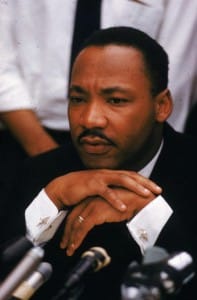
Recorded on Martin Luther King Day, Jan. 16, 2012 – Our guest is Hajj Malcolm Shabazz, the grandson of El Hajj Malik Shabazz, known as Malcolm X commonly. We’re celebrating Martin Luther King’s birthday today. A lot of people look at the legacy of Dr. Martin Luther King and see it as diametrically opposed to that of your grandfather, the late, great Malcolm X or El Hajj Malik El Shabazz. How do you see the legacy of Dr. Martin Luther King?
Hajj Malcolm Shabazz: All praises be to Allah. You know, I believe that many people view my grandfather’s position and the position of Martin Luther King to be on opposite sides of the spectrum in terms of my grandfather being a Muslim and Martin Luther King being a Christian, Martin Luther King preaching that one should turn the other cheek, a belief he adopted from Ghandi, and my grandfather taking a position that you should never be the aggressor but if a man puts his hands on you then you should see to it that he doesn’t have the ability to put his hands on anybody else – and you should protect your family and you should protect yourself.
Quite unfortunately, many people feel the need to take a position. They say, “I’m all for Martin Luther King; I really couldn’t understand what your grandfather was on.” Or they take the position as if they were backing my grandfather but they denounce and renounce Martin Luther King.
I believe that my grandfather’s movement and the movement of Dr. King was just as significant and just as important. The reason why I say this – and I take into consideration the time period and many other things, many different variables – but one other thing I take into consideration was the time period and television had just become more popular.
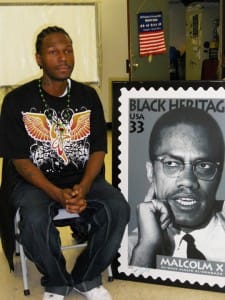
More homes were introduced to television and people all over the world could see what was happening in the United States through the television, through the media, at a time when the United States was trying to portray to the rest of the world that they were trying to fix the race problems here in the United States that were being exposed through the media.
So one of the things I noticed was that during this time, people all throughout the world could see all over the world on the television how dogs were being sicced on women and children and they were being sprayed down with high power hoses – women and children who were demonstrating peacefully. This was Martin King’s movement.
If you would have had the people out there fighting – you know the nature of your enemy and how they used their media. One of the things my grandfather said was that the media was a very dangerous tool. It will have you thinking that the oppressor is being oppressed and vice versa, so that’s something we have to be conscious of.
I remember when I was younger, I used to see the old war movies where you had two opposing forces marching towards each other and they’re killing each other off on the battlefield. I used to always think, “Why do they fight like that?” You know, today armies – militaries – they don’t fight like that. They have guerilla forces and they have developed some guerilla tactics.
People all over the world could see what was happening in the United States through the television, through the media, at a time when the United States was trying to portray to the rest of the world that they were trying to fix the race problems here in the United States that were being exposed through the media.
So when it comes to my grandfather’s methods and the methods of Martin Luther King, we can’t always all come at the enemy from the same direction, from the same angle. We have to come at the enemy from different angles and different directions.
If I was born during that time period, I don’t think I would have taken the position of Martin Luther King myself. I believe that I would be more inclined towards defending myself and defending my family against any attacks. But at the same time I believe his movement was just as significant.
When it comes to my grandfather’s methods and the methods of Martin Luther King, we can’t always all come at the enemy from the same direction, from the same angle.
M.O.I. JR: Can you speak to your family’s relationship with the King family after the assassination of your grandfather as well as Dr. King?
Malcolm: There has always been a very strong relationship between the Shabazz family and the King family. When I was younger, I used to see my grandmother (Betty Shabazz) and Ms. Coretta Scott King quite often. They had a very good relationship.
I remember being younger – 9 , 10, even up to when I was a teenager – getting phone calls; I’d go answer the phone and it would be Coretta. She would always greet me and ask to speak to my mom. Coretta Scott King was just like family, you know. My aunts had a better relationship with the children of Dr. King, where they interact more frequently. There was always been a good relationship between our families.
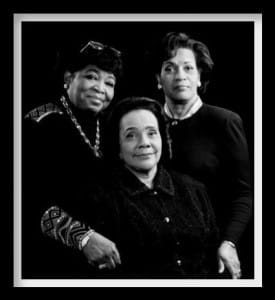
M.O.I. JR: And also I just want to note that there’s a famous picture with Dr. Betty Shabazz, Ms. Coretta Scott King and Ms. Merlie Evers as widows of our movement.
Malcolm: Yes, sir. It’s very important that despite whatever differences may arise or what appear as differences that we look beyond that to our common interests, especially amongst our own people. One thing my grandfather said when he came back (from Mecca); they think he said that all white people are good. No, that’s not what he said.
He said that he would never again put a blanket indictment over an entire race of people, but he said that if the white man here in America were to embrace Islam, he thought it would be a cure for many of the racial ills here in the United States.
But he said that, up until the day that he was assassinated, the position that he took, he said that white people could help us but they can’t join us. And he said the reason why they can’t join us is that because we first have to have Black solidarity – solidarity amongst our own – before we can have Black-white solidarity or try to go out and work with everybody else. We have to be strong within our own. We have to strengthen our own ranks.
So it’s very important when I see a picture like this with my grandmother and Coretta Scott King and Mrs. Evers; I’m delighted with it. It’s a real beautiful thing. It shows unity; it shows strength.
He said that white people could help us but they can’t join us. And he said the reason why they can’t join us is that because we first have to have Black solidarity – solidarity amongst our own – before we can have Black-white solidarity.
M.O.I. JR: Can you speak to the fact that your grandfather as well as Dr. King were both religious leaders? They weren’t just political leaders but they were religious and spiritual leaders who were engaged in the movement for civil rights and human rights. Can you speak to that and that style of activism in the United States?
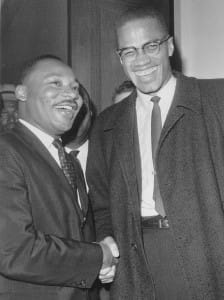
Malcolm: Well, you know, my grandfather was Muslim, Martin Luther King was Christian, and this is very important because there’s a lot of divisions even within Christianity or even within Islam itself. So it’s very important: It’s too many differences.
Oftentimes we’re in a position where the enemy can take advantage and exploit these differences. Those would be, well, I’m Shia, I’m Sunni, I’m Nation of Islam, I’m W.D. Muhammad, I’m Moor, I’m Christian, I’m Protestant, I’m Jehovah’s Witness. It’s all these differences that are amongst us.
One of the things that we need to realize is that if you had Jesus, Moses and Muhammad – peace be upon them all – in the same room at the same time, they aren’t going to be arguing with one another and debating against each another because they were all on the same team; they all worshipped the same God.
A sister sent me a message the other day and I appreciated it. It was an email, and in it she said, “You believe in Allah and I believe in God; we’re both religiously inclined. But Allah is just another way to say God; it’s just in Arabic. In Hebrew you might call him Jehovah, in English we say God, in Arabic it’s Allah, but it’s all the same God.”
I know my grandfather, when he was in the Nation of Islam and the Nation of Islam took the position where they only wanted to help or deal with other Nation of Islam members, they weren’t really about the communities. If you weren’t Muslim, they weren’t really trying to deal with you or help you.
My grandfather and Martin Luther King, despite their religions, they didn’t just worship their Lord within the church or stayed in the mosque worshipping Allah. They brought it out to the community.
You know my grandfather had two organizations: Muslim Mosque Inc. and the Organization of Afro-American Unity. Now Muslim Mosque Inc. was for those who shared the same religious beliefs, but the Organization for Afro-American Unity was for people who didn’t necessarily share the same religion but had similar socio-political ideologies – the spirit of activism.
My grandfather and Martin Luther King, despite their religions, they didn’t just worship their Lord within the church or stayed in the mosque worshipping Allah. They brought it out to the community.
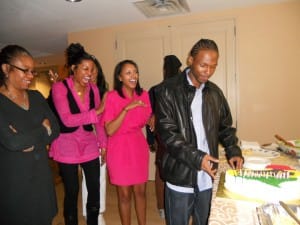
Editor’s note: Malcolm Shabazz was a dear friend of Minister of Information JR, who traveled with him extensively from 2010 through 2012, and of the Bay View newspaper. A few days after Malcolm was assassinated in Mexico City on May 9, 2013, at the age of 28, JR wrote that Malcolm “had a passion for helping young people understand and hopefully avoid the pitfalls that the U.S. government has set up for our community. He used his troubled life as a platform to let people in general know that he is not just preaching – he spent years locked up and, like his grandfather, he used the time to politically and spiritually educate himself for his next stage in life, that of an ever evolving freedom fighter.
“Malcolm was a very charismatic speaker, who had no problem holding a crowd’s attention. He was comfortable speaking to diverse audiences. He could speak in a masjid to Muslims from other nations in Houston, then turn around and spend 20-30 minutes talking to young people walking down the street in East Oakland. That was another skill he seems to have inherited from his grandfather.”
The People’s Minister of Information JR Valrey is associate editor of the Bay View, author of “Block Reportin’” and “Unfinished Business: Block Reportin’ 2” and filmmaker of “Operation Small Axe” and “Block Reportin’ 101,” available, along with many more interviews, at www.blockreportradio.com. He can be reached at blockreportradio@gmail.com. This interview was transcribed by Adrian McKinney.
Malcolm X telegrams Dr. King offering aid
“June 30, 1964
“Dr. Martin Luther King
“St. Augustine, Fla.
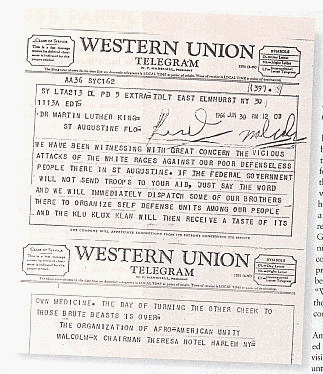
“The Organization of Afro-American Unity
“Malcolm X, Chairman
“Theresa Hotel
“Harlem, N.Y.”
The telegram can be found at Brother Malcolm.net, a research site compiled by the Black Left Unity Network. The Bay View thanks Randy Gould for sending it to us.





